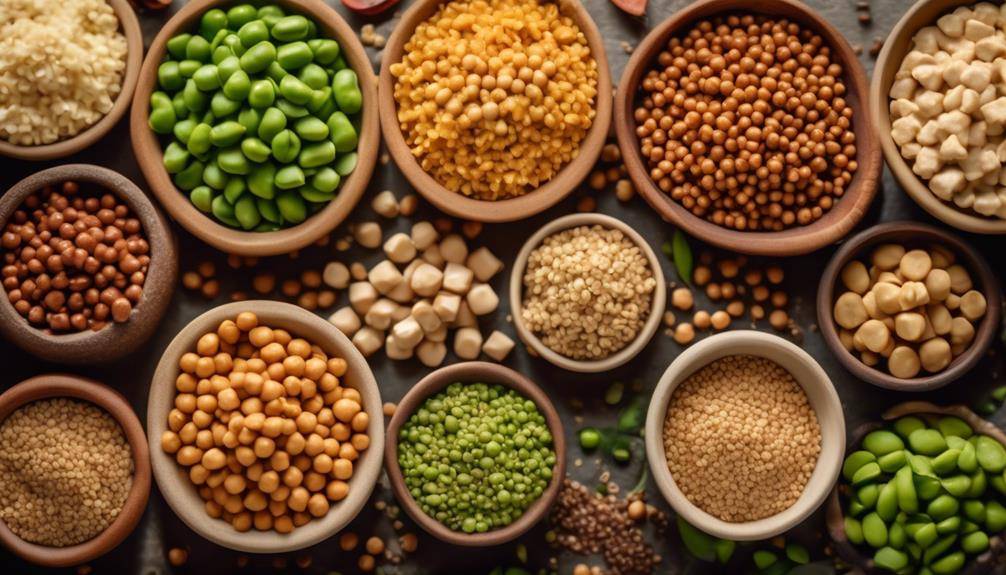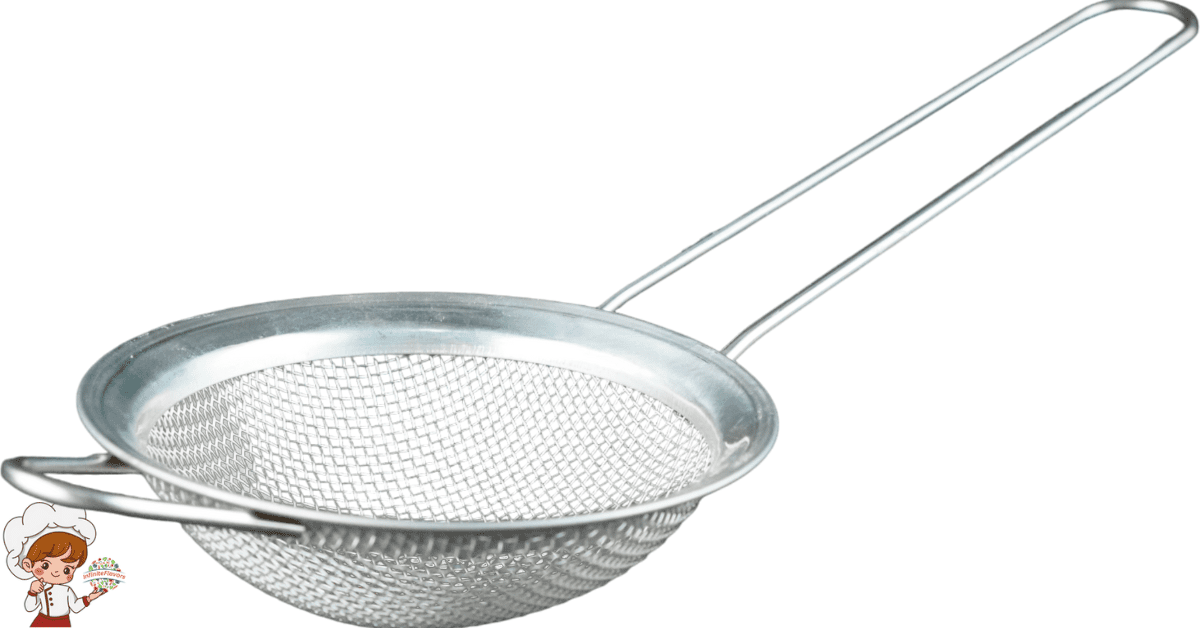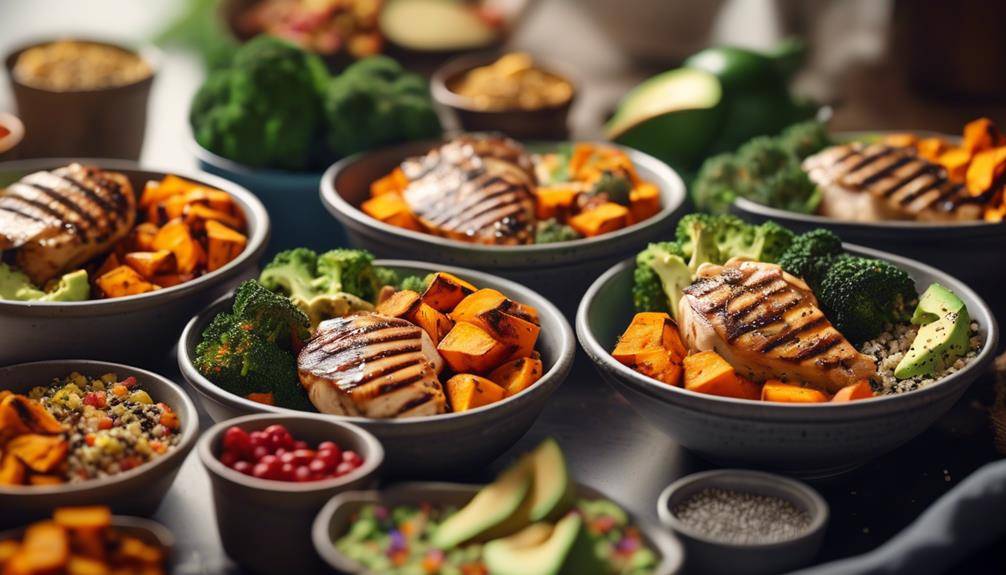New Trends in Plant Protein Foods

Trends in Plant Protein; Are you tired of the same old protein options and looking for something new and exciting to tantalize your taste buds? Well, look no further because the world of plant protein foods is experiencing a wave of innovative trends that are bound to captivate your culinary curiosity.
From plant-based meat alternatives that mimic the taste and texture of animal products to functional plant protein foods that offer additional health benefits, the possibilities are endless. But that’s not all – there are also plant protein snacks, powders, desserts, beverages, and even global sources of plant-based protein that are taking the food industry by storm. So, get ready to embark on a journey through the latest trends in plant protein foods that will leave you craving for more.
Plant-Based Meat Alternatives
Plant-based meat alternatives offer a nutritious and sustainable option for individuals seeking to reduce their consumption of animal products. These alternatives are derived from plant sources and are designed to mimic the taste, texture, and appearance of traditional meat products. They provide a viable solution for those who are looking to incorporate more sustainable protein sources into their diet.
One of the primary advantages of plant-based meat alternatives is their lower environmental impact compared to traditional meat production. The production of meat alternatives requires fewer resources, such as water and land, and produces fewer greenhouse gas emissions. According to a study published in the journal Science, switching from animal-based meat to plant-based alternatives could reduce greenhouse gas emissions by up to 84%. This reduction is primarily attributed to the lower methane emissions associated with plant-based protein production.
Plant-based meat alternatives also offer a range of health benefits. They are typically lower in saturated fat and cholesterol compared to animal-based meats, making them a heart-healthy choice. Additionally, these alternatives are often fortified with essential nutrients such as iron, zinc, and vitamin B12, which are commonly found in higher amounts in animal products. This makes plant-based meat alternatives a suitable option for individuals following a vegetarian or vegan diet.
Innovative Plant Protein Snacks
Innovative plant protein snacks provide a nutritious and convenient way to incorporate plant-based protein into your diet. As the demand for plant-based food options continues to rise, the market for plant protein snacks has seen significant growth and innovation. Consumers are increasingly seeking healthier and more sustainable alternatives to traditional snacks, and plant protein snacks have emerged as a popular choice.
One of the key trends in the plant protein snacks market is the use of innovative ingredients. Manufacturers are exploring a wide range of plant-based protein sources, including peas, lentils, chickpeas, and hemp. These ingredients not only provide a good source of protein but also offer additional nutritional benefits such as fiber, vitamins, and minerals. Companies are also experimenting with different flavors and textures to create a diverse range of snack options that cater to various taste preferences.
In addition to ingredient innovation, there is a growing emphasis on sustainability in the plant protein snacks market. Consumers are becoming more conscious of the environmental impact of their food choices and are seeking snacks that are produced using sustainable practices. Manufacturers are responding to this demand by using eco-friendly packaging materials and implementing sustainable sourcing and production methods.
Another trend in the plant protein snacks market is the development of functional snacks. These snacks are formulated to provide not only protein but also other health benefits, such as improved digestion, increased energy, or enhanced cognitive function. Ingredients like probiotics, adaptogens, and superfoods are being incorporated into plant protein snacks to offer additional nutritional value.
Plant Protein Powders and Supplements
With the increasing popularity of plant protein snacks, it is important to also consider the benefits and uses of plant protein powders and supplements in meeting your dietary needs. Plant protein powders and supplements offer a convenient and efficient way to increase your protein intake, especially for individuals following a vegetarian or vegan diet.
Plant protein shakes are a popular form of plant protein powder. These shakes are typically made by mixing plant-based protein powder with water or plant-based milk. They are a quick and easy way to consume a significant amount of protein in a single serving. Plant protein shakes are often used as a post-workout recovery drink, as they provide the necessary amino acids to support muscle repair and growth.
In addition to plant protein shakes, plant protein powders can also be used to make homemade plant protein bars. These bars are a great snack option for individuals looking to increase their protein intake. Plant protein bars can be made by combining plant protein powder with other ingredients such as nuts, seeds, and dried fruits. They can be a convenient and portable option for individuals on the go.
When choosing a plant protein powder or supplement, it is important to consider factors such as the source of the protein, the amino acid profile, and any added ingredients. Look for powders that are made from high-quality plant protein sources, such as pea, rice, or hemp. Additionally, consider the amino acid profile of the protein powder to ensure that it provides all the essential amino acids your body needs.
Functional Plant Protein Foods
Functional plant protein foods offer a variety of health benefits and can be a valuable addition to a balanced diet. One popular form of functional plant protein foods is functional plant protein bars. These bars are typically made from plant-based protein sources such as soy, pea, or hemp, and are fortified with additional nutrients to enhance their functionality.
Functional plant protein bars are designed to provide not only protein but also other nutrients that can support specific health goals. For example, some bars are formulated to support muscle recovery after exercise. These bars often contain a combination of protein, carbohydrates, and antioxidants to aid in muscle repair and reduce inflammation. Plant protein, such as pea protein, has been shown to be effective in promoting muscle recovery and growth, making it an excellent choice for individuals looking to optimize their post-workout nutrition.
Moreover, functional plant protein bars can also be a convenient and portable option for individuals with busy lifestyles. They can serve as a quick and easy snack or meal replacement, providing a balanced combination of protein, fiber, and other essential nutrients. This makes them suitable for people on the go or those who need a convenient source of nutrition during their busy day.
Plant Protein Desserts and Sweets
Plant protein desserts and sweets provide a delicious and nutritious way to indulge your sweet tooth while still meeting your dietary needs. These plant-based treats offer a wide range of options that are not only satisfying but also packed with essential nutrients. Here are some popular plant protein desserts and sweets that you can enjoy guilt-free:
- Plant protein ice cream: Made from ingredients like almond milk, coconut milk, or soy milk, plant protein ice cream offers a creamy and flavorful alternative to traditional dairy ice cream. It is often fortified with plant-based proteins like pea protein or hemp protein, providing a good source of amino acids and essential nutrients.
- Plant protein cookies: These cookies are made using plant-based protein powders such as pea protein or brown rice protein, which not only adds a nutritional boost but also enhances the texture and flavor. They are typically sweetened with natural sweeteners like dates or maple syrup, making them a healthier choice for dessert.
- Plant protein bars: These bars are a convenient and portable option for a quick snack or dessert. They are often made with a combination of plant-based protein sources such as pea protein, brown rice protein, or hemp protein, along with a mix of nuts, seeds, and dried fruits. Plant protein bars provide a good balance of macronutrients and are often fortified with vitamins and minerals.
- Plant protein puddings: These creamy and decadent desserts are made with plant-based milk, such as almond milk or coconut milk, and thickened with ingredients like chia seeds or tapioca pearls. They can be flavored with natural sweeteners like agave syrup or stevia and are often enriched with plant protein powders to enhance their nutritional profile.
Plant protein desserts and sweets not only satisfy your sweet cravings but also offer a variety of health benefits. By incorporating these plant-based options into your diet, you can indulge in guilt-free treats while still meeting your dietary needs.
Plant Protein Beverages and Smoothies
Plant protein beverages and smoothies offer a range of nutritional benefits. These drinks are an excellent source of plant-based protein, which is essential for muscle repair and growth. Additionally, plant protein smoothies are a popular choice for those looking to incorporate more protein into their diet while also enjoying a refreshing and delicious beverage. Finally, the market for plant-based protein drinks continues to expand, with innovative products offering unique flavors and ingredients to cater to different dietary preferences.
Nutritional Benefits of Plant Protein Beverages
When it comes to enhancing your nutritional intake, incorporating plant protein beverages into your diet can provide numerous benefits. Plant protein shakes, in particular, are a convenient and effective way to increase your protein intake while also enjoying a refreshing and delicious beverage. Here are some key nutritional benefits of plant protein beverages:
- High in protein: Plant protein beverages are packed with protein, which is essential for muscle building and repair.
- Complete amino acid profile: Plant proteins, such as pea, hemp, and soy, contain all the essential amino acids your body needs for optimal health.
- Rich in vitamins and minerals: Plant protein beverages often contain added vitamins and minerals, boosting your overall nutrient intake.
- Digestive health: Many plant protein beverages are also fortified with fiber, promoting a healthy digestive system.
Incorporating plant protein beverages into your diet can be a convenient and enjoyable way to meet your protein needs while reaping these nutritional benefits.
Popular Plant Protein Smoothie Recipes
To further explore the benefits of incorporating plant protein beverages into your diet, let’s now delve into some popular plant protein smoothie recipes that are both delicious and nutritious. Plant-based protein shakes have gained popularity among individuals seeking a vegan alternative to traditional protein sources. These smoothies not only provide an excellent source of protein but also offer a variety of essential nutrients.
One popular recipe includes blending a plant-based protein powder with almond milk, frozen berries, and a tablespoon of almond butter. Another recipe incorporates vegan protein bars into the smoothie by blending them with a banana, spinach, and coconut water. These recipes not only provide a convenient way to consume plant-based protein but also offer a tasty and satisfying option for individuals looking to enhance their protein intake.
Innovative Plant-Based Protein Drinks
Incorporating innovative plant-based protein drinks into your diet can provide a convenient and nutritious way to boost your protein intake. These drinks, commonly known as plant protein shakes or plant protein milkshakes, are becoming increasingly popular among health-conscious individuals. Here are a few key benefits of including plant-based protein drinks in your daily routine:
- High protein content: Plant protein drinks are typically fortified with high-quality plant proteins, such as pea protein, hemp protein, or brown rice protein. These proteins offer essential amino acids that promote muscle repair and growth.
- Nutrient-rich: Apart from protein, plant-based protein drinks often contain added vitamins, minerals, and antioxidants. These nutrients can support overall health and provide a well-rounded nutritional profile.
- Digestive-friendly: Unlike some animal-based protein sources, plant protein drinks are generally easier to digest and can be a suitable alternative for individuals with digestive sensitivities.
- Versatility: Plant protein drinks can be enjoyed on their own as a post-workout recovery beverage or used as a base for smoothies by adding fruits, vegetables, or nut butters for added flavor and nutrients.
Incorporating plant-based protein drinks into your diet can be a simple and effective way to meet your protein needs and support overall health and wellness.
Plant-Based Protein Sources From Around the World
Explore the rich tapestry of global plant protein sources that offer a diverse array of plant-based proteins. From legumes like lentils and chickpeas to grains like quinoa and amaranth, these plant-based protein sources are packed with essential amino acids and other nutrients. Incorporating these globally-sourced plant proteins into your diet can provide a sustainable and nutritious alternative to animal-based proteins.
Global Plant Protein Sources
Plant-based protein sources from around the world provide a diverse array of options for incorporating plant protein into your diet. These regional plant protein sources are not only rich in nutrients but also contribute to sustainable plant protein farming practices. Here are four noteworthy plant-based protein sources from different regions:
- Quinoa: Originating from the Andean region of South America, quinoa is a complete protein source that contains all essential amino acids. It is also gluten-free and high in fiber.
- Lentils: Widely consumed in India and other parts of Asia, lentils are an excellent source of protein, fiber, and folate. They are versatile and can be used in various dishes.
- Soybeans: A staple in many Asian diets, soybeans provide a complete protein profile and are also a source of healthy fats. They are used to make tofu, tempeh, and soy milk.
- Chickpeas: Commonly used in Mediterranean and Middle Eastern cuisines, chickpeas are a good source of protein, fiber, and vitamins. They are the main ingredient in hummus and falafel.
Incorporating these plant protein sources into your diet can help diversify your nutrient intake while supporting sustainable farming practices.
Diverse Plant-Based Proteins
Quinoa, lentils, soybeans, and chickpeas are just a few examples of diverse plant-based protein sources from around the world, offering a wide range of nutrient-rich options for incorporating plant protein into your diet. Plant-based protein sources have gained popularity due to their numerous health benefits. These sources are not only rich in protein, but they also provide essential vitamins, minerals, and fiber.
Quinoa, for instance, is a complete protein source containing all nine essential amino acids. Lentils are an excellent source of protein and are also high in iron and fiber. Soybeans are not only packed with protein but also contain healthy fats and phytochemicals that promote heart health. Chickpeas, on the other hand, provide a good amount of protein along with dietary fiber, folate, and iron. Incorporating these diverse plant-based protein sources into your diet can help you meet your nutritional needs while enjoying a wide variety of flavors and textures.
Trends in Plant Protein; Frequently Asked Questions
What Are the Potential Health Benefits Associated With Consuming Plant Protein Foods?
Consuming plant protein foods can provide potential health benefits, including positive impacts on weight management. They are rich in nutrients, low in saturated fats, and may help reduce the risk of chronic diseases.
Are Plant Protein Foods Suitable for Individuals With Certain Dietary Restrictions, Such as Gluten-Free or Vegan Diets?
Plant protein foods can be suitable for individuals with certain dietary restrictions, such as gluten-free or vegan diets. They provide alternative sources of protein for those with allergies or those who want to manage their blood sugar levels, like diabetic individuals.
How Do Plant Protein Foods Compare to Animal-Based Protein Foods in Terms of Nutritional Value?
Plant protein foods have several benefits compared to animal-based protein foods. They offer similar nutritional value and are often lower in saturated fat and cholesterol. They are also rich in fiber, vitamins, and minerals, making them a healthier choice for overall nutrition.
Can Plant Protein Foods Help With Weight Management and Muscle Building?
Plant protein foods can indeed help with weight management and muscle building. They offer weight loss benefits due to their high fiber content and lower calorie density compared to animal protein. Additionally, plant protein is just as effective as animal protein in promoting muscle growth.
Are There Any Specific Plant Protein Foods That Are Particularly Rich in Certain Nutrients or Have Unique Health Benefits?
Are there plant protein foods that are rich in certain nutrients or have unique health benefits? Yes, some plant protein foods, such as quinoa and hemp seeds, are high in essential amino acids and offer environmental benefits compared to animal protein sources.
Conclusion
In conclusion, the plant protein food industry is experiencing a surge in new trends and innovations. Plant-based meat alternatives are becoming increasingly popular, offering a sustainable and healthier alternative to traditional meat products. Innovative plant protein snacks, powders, and supplements are providing convenient options for those looking to increase their protein intake. Additionally, functional plant protein foods are being developed to cater to specific dietary needs. Plant protein desserts, sweets, beverages, and smoothies are also gaining traction. With a wide variety of plant-based protein sources from around the world, consumers have numerous options to choose from.








